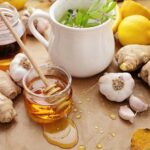Helpful Herbs for Respiratory Infections
In this article regarding plants or herbs for respiratory infections, it is important to understand that it is quite hard or difficult to classify the respiratory infections that affect the lungs, the nasal cavity and the bronchi.
However, since respiratory infections are divided into two major types (1) upper respiratory system (sinusitis, laryngitis, pharyngitis) and (2) lower respiratory systems (pneumonia, bronchitis), it is much easier to classify their symptoms.
Symptoms of Respiratory Tract Infections
Let’s take a look at the symptoms of respiratory infections.
Now, they have been classified based on the part they affect. Here are the symptoms of upper respiratory infections. The following symptoms are encountered
- Fever
- Sore throat
- Cough
- Swollen lymph nodes especially in the neck
- Feeling of fatigue
For lower respiratory tract infections, the symptoms may seem quite severe and may include the following;
- Whistling
- Chest pain
- Severe cough
- Blue tint of the skin
Causes of RI
Generally, when a microorganism is transferred to our respiratory tract, it leads to a respiratory system or tract infection.
Specifically:
- viruses (respiratory syncytial virus RSV),
- fungi
- bacteria, such as staphylococcus or staphylococcus aureus
- mycoplasma, which is either a bacterium nor a virus bit a microorganism that both characteristics.
One of the means of transfer is through a handshake. After shaking hands with a patient or by merely touching someone that’s already contaminated or a surface that’s contaminated and then placing our hands near the mouth or in the mouth, they can easily enter out body.
Does respiratory infections last long?
It depends on the microorganism (bacteria or virus) and also on the health status of every individual, the symptoms may subside within some few days or even weeks. A cough that’s post-infections may still persist even for 3 – 4 weeks after the symptoms and other related symptoms must have subsided. Sometimes, upper respiratory system infections may get resolved on their own and last 1 – 2 weeks at most.
However, it is imperative to see a doctor if the symptoms persist for more than 2 weeks.
Herbs for Respiratory Infections
The following are some of the herbs for respiratory infections. They are:
- Sage
- Thyme
- Eucalyptus
- Garlic
- Anise
- Common plantain
- Nasturtium
- Garden violet
- Watercress
- Linden
- Camphor Tree
- Desert Tea
- Black mustard
Sage
Sage has quite enormous benefits and offers excellent protection especially to the respiratory system.

Its properties are: anti-inflammatory, expectorant and antimicrobial. Sage as one of the herbs for respiratory infections helps manage cough.
When put together with echinacea, it tends to contribute a faster recovery from all sorts of symptoms of flu and common cold.
Thyme
Dry extract gotten from its leaves and flowers are used for more a thousand years to treat cough.
In essence, it contains vitamins C, A, iron and most importantly thyme contribute to the strengthening and fast recovery of the immune system. Thyme is antiseptic, expectorant and antitussive.
Eucalyptus
The Eucalyptus oil and also the dry extract of the leaves have been in use for years to improve the symptoms of cough and those of common cold.
Eucalyptus is quite beneficial in cases of bronchitis. This is due to the fact the actions of eucalyptus are somewhat antibacterial.
As one of the herbs for respiratory infections, it is balsamic, antiseptic and also regenerate the bronchial mucosa.
Garlic
The active compound in garlic called allicin contains and makes available antioxidants. It is also antiseptic and has antimicrobial properties.
With this, it does not only contribute to the improvement of the upper respiratory symptoms, it also helps in strengthening the immune system.
Alyile disulphur which is responsible for its smell, is quite expectorant and anti-antiasthmatic.
Anise
This is one of the herbs for respiratory infections. The beneficial effects of this plant is that, it promotes the elimination of the bronchial mucus and also helps in overcoming tobacco damages.
Common Plantain
This plant makes secretion more fluid, reduces the inflammation of the bronchial mucosa. As one of the herbs for respiratory infections, it is quite useful in cases of pneumonia and bronchitis.

This is a plant commonly used in cases of bronchitis. As one of herbs for respiratory infections, it makes mucus more fluid, reduces congestion of the bronchi.
Another benefit to using making use of the herb is the fact that it is used for easing cough.
Garden Violet
Commonly used in cases of pneumonia, it is used in treating respiratory infections such as pneumonia because it reduces congestion of the bronchi. Other benefits are:
- Eases cough
- Soothes respiratory mucosa
Watercress
I made a detailed post regarding watercress, it is important to know the uses of this helpful plant.
Watercress are commonly in cases of lung emphysema. The sulphur essence in it helps promote expectoration and also good at reducing the congestion of the respiratory system.
Linden
Linden is used in treating cough because it soothes the bronchi. It offers antispasmodic effect on the bronchi. It is seen as one of the herbs for respiratory infections.
Camphor Tree
Camphor Tree is another plant seen as one of the herbs for respiratory infections. It is used in cases of asthma and pneumonia.
This is because it stimulates respiratory nerve center and helps in increasing frequency and depth of the breathing.
On pneumonia, it does the same as in cases of asthma.
Desert Tea
This helps in relaxing bronchial muscles.
Black mustard
This has revulsive effects and helps in reducing the congestion of inner organs. It is used in treating bronchitis and pneumonia.
Other herbs for respiratory infections include:
- Licorice which promotes expectoration, eases cough, reduces inflammation of the respiratory ways
- Silver fir which is balsamic, antiseptic and quite expectorant.
- Annotta Tree, which is expectorant
- Iceland Moss, which is antibiotic, pectoral and expectorant
- Goldenseal which helps regenerate cells of the mucosa
- Juniper, which is bronchial antiseptic and expectorant
- High mallow, which is expectorant and antitussive.
- Wild Marjoram, which is expectorant and antitussive.
- Speedwell, which prevents asthma crisis
- Valerian, which is antispasmodic, sedative.
Insights on the herbs for respiratory infections
Respiratory infections can cause discomfort and affect the respiratory system, including the throat, lungs, and sinuses.
Herbs are not a substitute for treatment, but some herbs have properties that support respiratory health and may relieve certain symptoms.
Here are some herbs commonly used in traditional medicine for respiratory infections.
Echinacea:
Echinacea is commonly used to strengthen the immune system and reduce the severity and duration of respiratory infections. It may have anti-inflammatory and antiviral properties.
Garlic:
Garlic has antibacterial properties and helps prevent infections. It also helps relieve congestion and support the immune system.
Ginger:
Ginger is known for its anti-inflammatory and antibacterial properties. Helps relieve coughs, nasal congestion, and sore throats associated with respiratory infections.
Licorice:
Licorice root is an expectorant, which helps loosen phlegm and relieve coughs. It also has anti-inflammatory properties and soothes inflammation of the airways.
Thyme:
Due to its antibacterial properties, thyme is used for respiratory diseases. Relieves coughs and airway congestion to support respiratory health.
Oregano:
Oregano contains compounds with antibacterial properties that may help prevent respiratory infections. Available in oil or tea form.
Peppermint:
Peppermint is known for its decongestant and calming effects. Helps relieve sinus congestion, coughs and sore throats.
Mullein:
Mullein is commonly used to relieve respiratory symptoms such as cough and bronchitis. It has an expectorant effect and helps soothe inflamed airways.
These herbs may have some benefits, but it’s always a good idea to consult your doctor, especially if you’re suffering from a severe or persistent respiratory infection.
They will make a proper diagnosis and advise you on the most appropriate treatment options for your particular condition.
Respiratory infections and diet
Studies have shown that participants had a reduced risk of pneumonia, flu, and other respiratory infections when they took it
– coffee
– tea
– fatty fish
– nuts (raw, unsalted)
– fruits
Conversely, consumption of red meat increased the risk.
In addition, consumption of probiotic-rich foods (yogurt, kefir, sauerkraut, olives) helps to strengthen the intestinal flora and protect the immune system at the same time.
In general, you should consume foods rich in vitamins, minerals and trace elements to support and stimulate your body’s defense mechanisms. A balanced diet plays an important role in protecting our bodies from respiratory infections.
Foods to avoid with Kidney Failure
How To Take Care of Your Kidney
Causes of Hypertension in Young Adults
Oligospermia Natural Treatment
Home Remedies for Motion Sickness
How To Live With HIV-Positive Person

A graduate of Computer Science and Information Management Technology. Diploma – Caregiving, Certificates – Dementia and Diabetes Awareness and Management. A researcher, blogger, songwriter, singer and acoustic guitarist. Born in an environment where natural talents such as healing are imparted at our natural birth. This natural talents of healing is the result of our genetic inheritance and the training from family environment.



















